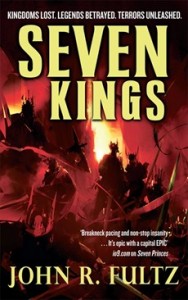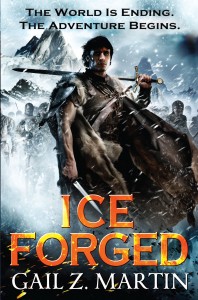Epic Fantasy Interview Swap: John R. Fultz interviews Gail Z. Martin
Today John R. Fultz interviews Gail Z. Martin about epic fantasy and her new novel ICE FORGED (US | UK | AUS). If you’re just joining us, here is the first part of the discussion.
…
John R. Fultz: ICE FORGED is a “fresh start” in a new fantasy world, one that is separate from your previous five books (which were all set in the same world). Why start fresh after six books’ worth of fleshing out your first fictional universe? Along those lines, what was your initial inspiration for ICE FORGED and the Ascendant Kingdoms?
Gail Z. Martin:I love my characters and the world I created in my previous series (Chronicles of the Necromancer series and The Fallen Kings Cycle), but the action had come to a natural resting point. I still hope to tell more stories about that world, but there is a natural break in the action for the characters, so it seemed like a good time to go do something else myself for a while.
I got some of the inspiration for Ice Forged and the new Ascendant Kingdoms Saga series by turning a few elements of my original series upside-down. In my first series, my main character is a necromancer, with very powerful magic. In Ice Forged, my main character has very little magic, more on the hedge witch level of power. In the Chronicles of the Necromancer/Fallen Kings books, my main character keeps magic from failing. In Ice Forged, the magic upon which the civilization depends becomes impossible to harness and wipes out much of civilization. In my original series, my main character was wrongfully hunted as an outlaw. In Ice Forged, my main character not only actually committed the murder for which he is exiled, he is unrepentant about it.
Stories, for me, begin with the question, “What if?” What if…a civilization depended on magic like we depend on the power grid—and the magic could no longer be controlled? What if…the only one who might be able to restore the magic was someone exiled to the farthest reaches of the world? What if…the future of the kingdom depended on a handful of convicts?
My other favorite question is, “And then what?” As I think through a plot, I always ask myself, “And then what?” So they have a battle—and then what? So there’s a confrontation with the forces of the opposition—and then what? So they win a battle—and then what? Even after a victory, there are messes to clean up. For me, that’s where the story starts.
John R. Fultz: I read that you have always been a major science fiction fan, yet you mainly write epic fantasy. What about this genre draws you to it? (Any plans to write sci-fi someday?)
Gail Z. Martin: While I enjoy sci-fi movies and have read some hard sci-fi, my heart belongs to epic fantasy. I was a medieval history major in college, and I have always loved reading history. I figure I write the epic tales that should have happened—but didn’t! I also enjoy writing about a world without the immediacy of electricity, warp drive, modern communication and the technology that underpins good sci-fi. It imposes a whole different discipline on a story if there is no way for characters in one location to hear about the outcome of a battle hundreds of miles away faster than a man on horseback can ride or a carrier pigeon can fly. I don’t even use gun powder in my stories, because I like the face-to-face element of medieval combat.
I know a number of sci-fi writers, and they all have Ph.D.s in things like nuclear physics or quantum mechanics. I was never that good at math! So I’ll leave the ray guns to the folks who can actually work out the numbers, and stick with swords!
John R. Fultz: What are your Top 5 fantasy novels and why?
Gail Z. Martin: The Lord of the Rings trilogy (that counts for three books!) because it opened my eyes to the scope of real epic fantasy.
The Last Herald Mage trilogy because of the depth of world building and also how real the character of Vanyel became to me as I read it—it set quite a high bar.
The Camber of Culdi books, because of the detail and realism with which the medieval setting was envisioned.
American Gods, not only because Neil Gaiman is a frickin’ awesome writer, but also because he managed to bring folklore into the modern setting and did it hauntingly well.
The Complete Stories and Poems of Edgar Allan Poe. His ability to create atmosphere and suspense is superb.
And let’s not forget Hamlet and Macbeth, which I read over and over again because they had ghosts in them!
These and many more books have been writing influences. I learn something from every book I read!
John R. Fultz: Do you outline extensively, or take a more “write-as-you-go” approach to plotting?
Gail Z. Martin: I begin with an outline (it makes my editor happy), but the outline tends to be rather loose and although I know where the beginning and main points and ending need to be, there’s room for interpretation as the muse strikes while I’m writing. Many of the elements that I am happiest with in my books have come out of thin air. I didn’t plan them, I didn’t know they were going to happen, but they were absolutely right.
John R. Fultz: Do you design characters before you write (as character profiles) or do you prefer to “discover” the characters as you write them?
Gail Z. Martin: I have the main characters very clear in my head before I begin, although I don’t write extensive character profiles. As the book goes on, I learn a lot about my characters, and I love it when they surprise me. Sometimes, they refuse to do what I thought they would do—and what they insist on doing is much better! I’ve also had characters steal scenes. There have been a couple of characters that I thought would just be minor, “walk-on” roles who bloomed into larger secondary characters. I’ve learned to run with it when that happens—I’m always anxious to see what’s going to happen!
John R. Fultz: Do you listen to music as you write, or write in silence? If so, what music works for you?
Gail Z. Martin: I usually have music on. If it’s a battle, I like classical. (Lots of percussion and brass.) If it’s highly atmospheric, I like soundtracks by Midnight Syndicate. And other times, I like either light jazz or spa/new age stuff. I can’t listen to pop/rock or anything with lyrics though when I write—it breaks my concentration. But I have no problem with rock when I’m editing!
John R. Fultz: What’s your opinion of the fantasy genre today, and where would you like to see it go?
Gail Z. Martin: I’m thrilled that books like Harry Potter and the Sookie Stackhouse novels and yes, even Twilight, have brought in new readers to the genre who might otherwise never have wandered down the fantasy isle. Likewise, I’m happy to see the success of movies like the Lord of the Rings trilogy and TV shows like Game of Thrones and the other fantasy-setting series. Some of those viewers will decide to try out books, and that’s a win for all of us.
I worry a little about the uber-dark trend in a lot of fantasy and YA. Yes, there is darkness in the world and great evil. But I believe that, over the course of history, ultimately, the Light wins. I believe in heroes—people who, whatever their other flaws, sometimes do the right thing for the right reasons, even at great personal cost. I’m not a big fan of ambiguous protagonists, ones who are so gray that they have no redeeming qualities. Scarred heroes, broken heroes, conflicted heroes—yes. Most people are a tangle of motivations. But I still want to be able to tell who the good guys are and root for them. And from the readers I encounter, a lot of other people seem to share that feeling.
John R. Fultz: What are you reading at the moment (fiction and/or non-fiction)?
Gail Z. Martin: I tend not to read much epic fantasy when I’m writing, because I don’t want to be influenced. So I read a lot of urban fantasy, paranormal mystery and mystery series. I’m always reading collections of ghost stories and folk tales—I get a lot of ideas from the stories sourced by our collective memories. And sooner or later, I post my newly read titles on my Goodreads shelf!


